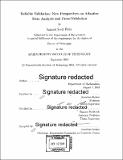Reliable validation : new perspectives on adaptive data analysis and cross-validation
Author(s)
Elder, Samuel Scott
DownloadFull printable version (6.434Mb)
Alternative title
New perspectives on adaptive data analysis and cross-validation
Other Contributors
Massachusetts Institute of Technology. Department of Mathematics.
Advisor
Jonathan Kelner and Tamara Broderick.
Terms of use
Metadata
Show full item recordAbstract
Validation refers to the challenge of assessing how well a learning algorithm performs after it has been trained on a given data set. It forms an important step in machine learning, as such assessments are then used to compare and choose between algorithms and provide reasonable approximations of their accuracy. In this thesis, we provide new approaches for addressing two common problems with validation. In the first half, we assume a simple validation framework, the holdout set, and address an important question of how many algorithms can be accurately assessed using the same holdout set, in the particular case where these algorithms are chosen adaptively. We do so by first critiquing the initial approaches to building a theory of adaptivity, then offering an alternative approach and preliminary results within this approach, all geared towards characterizing the inherent challenge of adaptivity. In the second half, we address the validation framework itself. Most common practice does not just use a single holdout set, but averages results from several, a family of techniques known as cross-validation. In this work, we offer several new cross-validation techniques with the common theme of utilizing training sets of varying sizes. This culminates in hierarchical cross-validation, a meta-technique for using cross-validation to choose the best cross-validation method.
Description
Thesis: Ph. D., Massachusetts Institute of Technology, Department of Mathematics, 2018. Cataloged from PDF version of thesis. Includes bibliographical references (pages 107-109).
Date issued
2018Department
Massachusetts Institute of Technology. Department of MathematicsPublisher
Massachusetts Institute of Technology
Keywords
Mathematics.